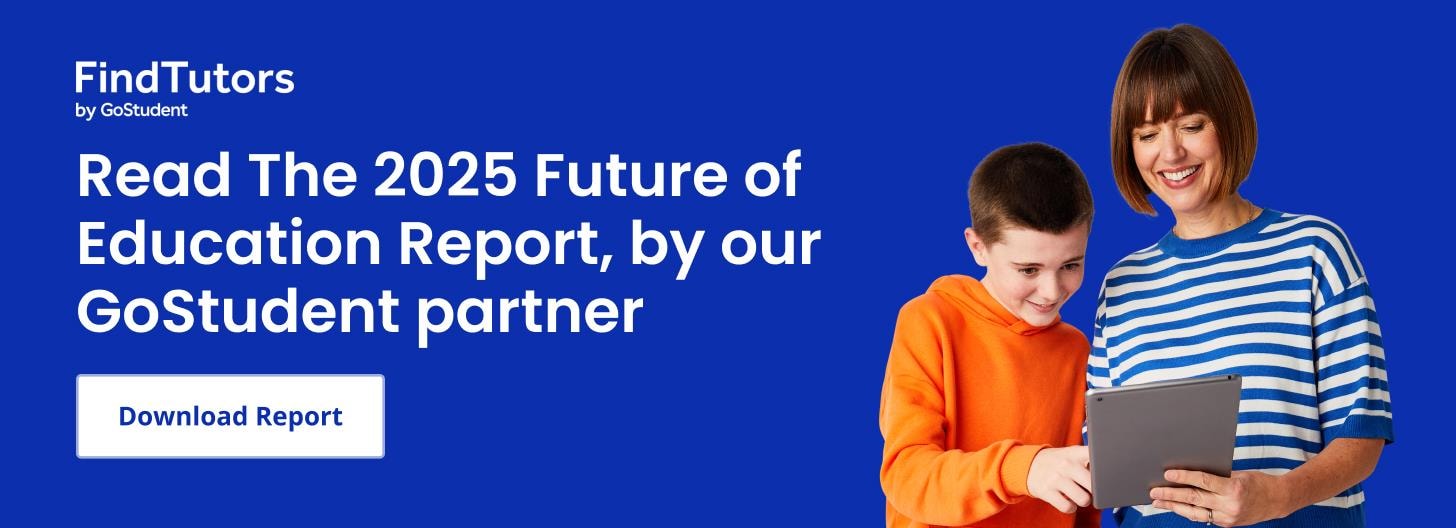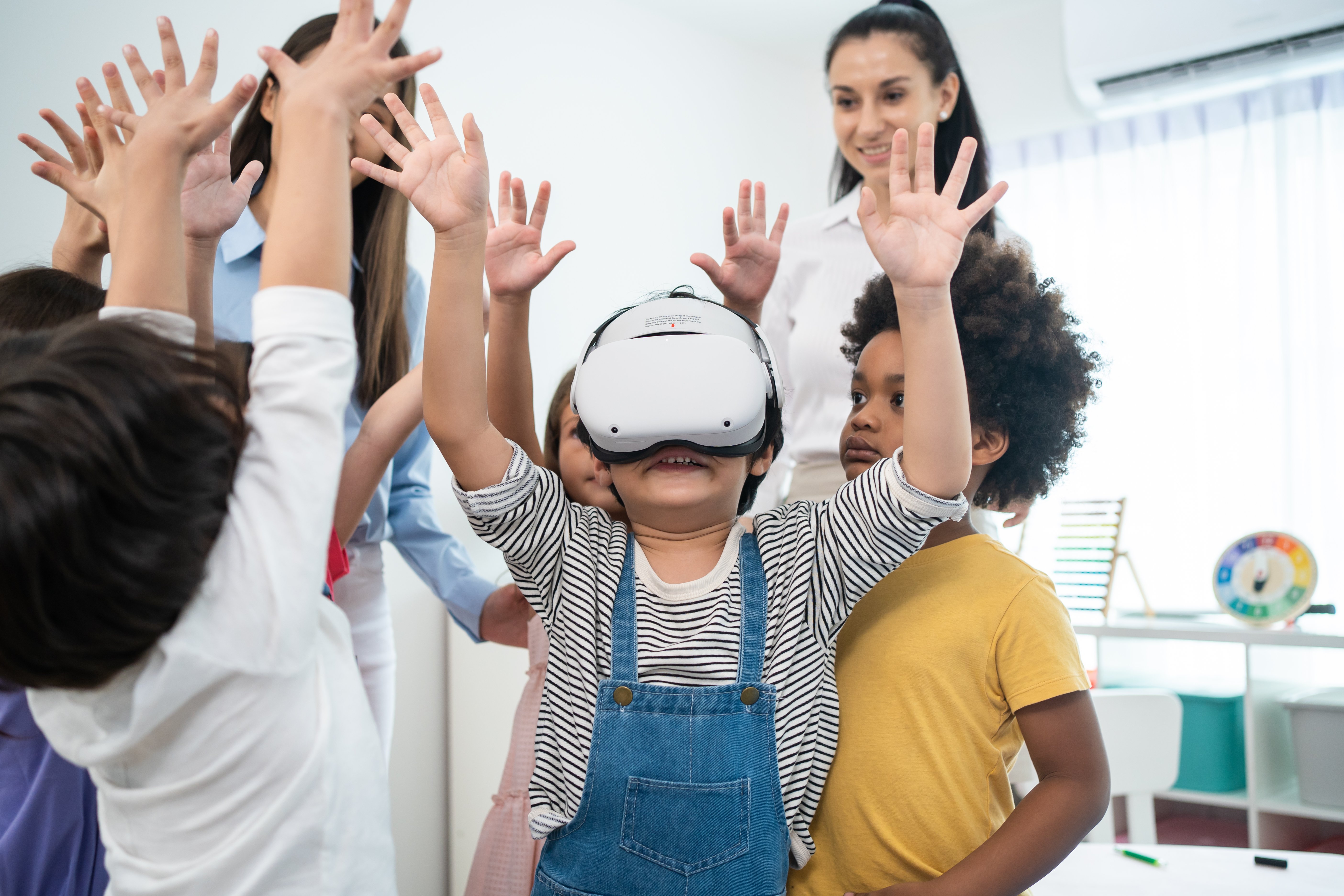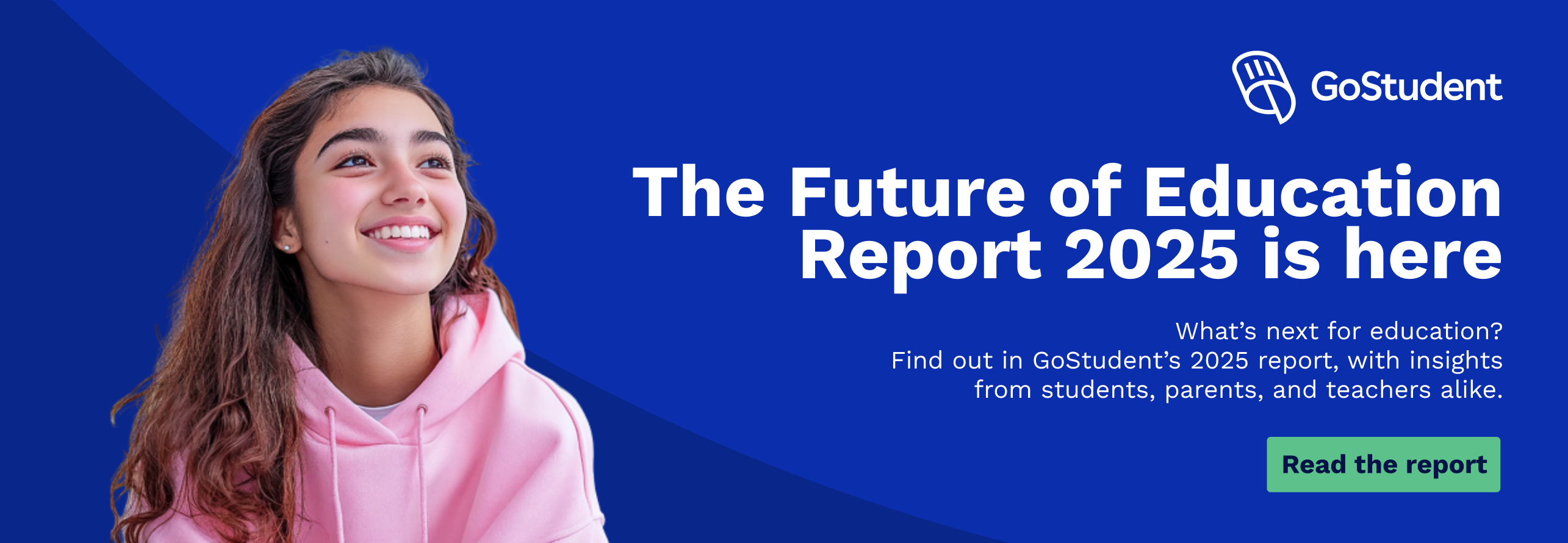1. Teaching for the Future: What needs to change?
2. No more exams: Are simulation-based assessments the way forward?
3. AI Learning: Which tools do students need to master?
4. Smartphones and screentime: Knowledge boosters or endless distraction?
5. Fact vs. Fiction: How does online misinformation influence education?
6. How new tech shapes study choices: Are we done with dance?
7. Soft skills and saving money: What education reforms need to focus on
8. Digital education: Where do teachers stand?
9. Technology integration: Same classrooms, more inclusive learning environments?
Technology and artificial intelligence are reshaping the education sector at an unprecedented speed. Understanding the influence that online education and AI tools such as Chat GTP have on students' learning is critical to ensuring their safety, skillsets and future academic success.
At FindTutors, we've analysed over 40 statistics based on insights from the 2025 Future of Education Report by our partner, GoStudent.

The report surveyed 5,859 parents and children across six European countries: Austria, France, Italy, Spain, Germany and the UK. In total, the study featured 1,000 parents and children in the UK, in addition to 300 teachers.
It offers cutting-edge insights into the evolution of the education industry, exploring how smart devices, AI writing assistants, virtual reality and other tech tools are transforming learning in the digital world.
So, as teachers and pupils embrace digital tools in lieu of traditional teaching methods, what is the true impact of integrated technology on education?
Key Takeaways:
-
75% of teachers say that simulation-based assessments should replace essays and exams.
-
70% of UK teachers believe AI will be central to students' future careers.
-
67% of teacher and 59% of parents believe children will be unprepared for the world of work without online access.
-
Only 30% of UK students currently have access to AI-powered tools in the classroom.
-
59% of UK teachers and 51% of UK parents say the best approach is combining human teaching with AI tools.
(Source: GoStudent Future of Education Report 2025)
These figures demonstrate that digital educational opportunities, combined with the development of soft skills, are key to preparing students for today's tech-forward labour markets.
1.Teaching for the Future: What needs to change?
Education technology needs to be center stage
The unifying trend among parents, children and teachers across Europe is a strong desire for change within formal education systems. As advanced digital technologies become further integrated into aspects of everyday life, educational institutions must adapt in order to meet the needs of their students - interactive whiteboards no longer cut it as innovative teaching tools.
With many education technology companies offering online learning platforms with highly customisable tuition solutions, preferences for personalised learning are making it increasingly difficult for traditional classrooms to maintain student engagement:
-
62% of parents in Europe think that new ways of assessing students' abilities will be needed as AI technology progresses.
-
59% of parents across Europe feel that grades do not accurately reflect children's abilities.
-
In Europe, 34% of teachers believe that current testing formats cause students undue stress.
-
62% of students in Europe want their teachers to be more knowlegeable about AI.
(Source: GoStudent Future of Education Report 2025)
2. No more exams: Are simulation-based assessments the way forward?
Old formats can't test new knowledge
With the rise of technology, both teachers and parents agree that traditional exam formats are no longer an effective way of measuring academic performance.
Many teachers support simulation-based assesment methods adapted from the healthcare industry, leveraging augmented reality technology that places a greater emphasis on real-world problem solving skills:
-
84% of UK teachers are in favor of simulation-based assesment methods.
-
69% of teachers across Europe support digital portfolios as a way of tracking student progress.
-
63% of teachers in Europe back AI-based adaptive testing to tailor assessments to a student's ability.
-
65% of parents in Europe feel that knowlng how to access information via digital resources is more important than memorising it for exams.
(Source: GoStudent Future of Education Report 2025)
3. AI Learning: Which tools do students need to master?
Access to education technology is critical
Parents and teachers are certain that digital skills are essential for students to succeed in their careers. Equitable access to technology in the classroom isn't a guarantee, however. Only 30% of UK students have AI-powered learning tools made available to them at school, while 70% of teachers think that access to AI needs to be a basic human right.
Teachers across Europe consider fluency in a variety of tools to form the basis of effective and efficient education in 2025:
-
35% of teachers believe that proficiency in generative AI tools is crucial.
-
29% of teachers cite being able to use AI writing assistants as important.
-
29% of teachers view AI language learning tools as having a significant impact.
-
23% of teachers consider knoweldge of AI maths tools a priority.
(Source: GoStudent Future of Education Report 2025)

4. Smartphones and screentime: Knowledge boosters or endless distraction?
Students prefer online study — when they can focus on it
While the majority of parents recognize the advantages of digital literacy, worries remain around screentime and its impact on students's physical and mental health.
Beliefs around the advantages and potential harms of students' smartphone and internet use are vary by group:
-
20% of parents in Europe are concerned smartphones causing shorter attention spans
-
68% of parents in the UK report significant benefits from online learning.
-
67% in Europe of teachers believe that without access to online tools, children will not be prepared for the world of work.
-
42% of students in Europe say that conducting research for homework using online resources is easier than with traditional textbooks.
(Source: GoStudent Future of Education Report 2025)
5. Fact vs. Fiction: How does online misinformation influence education?
The challenges posed by misleading digital content
Being able to separate trustworthy sources from false information is key to the development of critical thinking skills. The boom in AI-generated content — especially advancements in generative image technology — has the potential to compromise online educational resources.
There are differing perspectives between students, parents and teachers when it comes to discerning reliable information online:
-
85% of children in Europe claim that they are aware of the risks of false content.
-
47% of teachers in Europe state that students are unable to accurately identify false content.
-
43% of UK parents say that they struggle to detect false information online.
-
Despite the negative educational impact of false content, only 28% of teachers in the UK encourage students to factcheck information.
(Source: GoStudent Future of Education Report 2025)
6. How new tech shapes study choices: Are we done with dance?
AI evolution impacts both art and science
The impact of rapid technological advancement on potential career paths is apparent throughout educational institutions across Europe, as student engagement with arts and humanities continues to fall in 2025.
Teachers also note that traditional ways of teaching maths and science-related subjects are no longer fit for purpose, while parents think that religious studies do hold much weight for the future:
-
30% of students in Europe no longer consider dance as a viable career option.
-
23% of parents in Europe think that religious education is not a priority.
-
22% of teachers across Europe consider computer science to be a poor choice in the age of AI.
(Source: GoStudent Future of Education Report 2025)

7. Soft skills and saving money: What education reforms need to focus on
Students need access to educational materials that cover real-world skills
In spite of many students losing confidence in the career prospects of drama and music, the role that such subjects play in the development of empathy and emotional regulation may mean that they maintain a place in the future of education.
Meanwhile, students express that they would like applicable life skills to form part of their school curriculum:
-
74% of parents in the UK feel that soft skills such as emotional intelligence, communication and problem solving are key to navigating AI-first industries.
-
40% of teachers in Europe think that stress management is the most important life skill for students to learn.
-
36% of students are keen to study foreign languages to gain an advantage in a globalized world
-
31% of students in Europe consider financial literacy - with an emphasis on the practicalities of taxes and budgeting- to be the best way to prepare for the future.
(Source: GoStudent Future of Education Report 2025)
8. Digital education: Where do teachers stand?
Using AI to enhance student engagement
Educational technology has been widely recognised as a way to reduce time spent on lesson design, marking and creating learning materials. Along with planning, digital technologies have also been shown to significantly ease teachers workloads with regard to student data management and admin tasks.
While educational professionals say that more teacher training is required to ensure that they have the necessary AI skills, there remains a shared understanding with parents that tech should not take over completely:
-
74% of teachers in the UK share that they have not received formal training in AI technology.
-
59% of teachers in Europe believe that pairing artificial intelligence with human teachers is the most impactful approach to education.
-
58% of UK teachers consider that personalised learning requires AI at its foundation.
-
58% of parents in the UK think that AI tutors will enhance learning, but that they should not replace human teachers.
(Source: GoStudent Future of Education Report 2025)

9. Technology integration: Same classrooms, more inclusive learning environments?
How tech can help keep kids connected
Employed in the right way, digital learning tools can help boost collaboration between students of different abilities in the same class. For example, students who struggle with dyslexia may use text-to-speech tools to make literature the class is reading together more accessible, allowing them to contribute to group discussions.
In addition to enhancing academic progress, tech can also help ensure that students maintain relationships and activities outside of school:
-
53% of parents in the UK believe that AI can provide their child with a personalised learning experience tailored to their needs.
-
52% of students across Europe say that tech helps them stay in touch with friends and school.
-
26% of students in Europe enjoy using tech to explore new hobbies and interests, opening up social connections and extracurricular learning opportunities.
(Source: GoStudent Future of Education Report 2025)
The shared mission to transform education
Both parents and teachers have a duty to ensure that students have access to a tech-focused, quality education.
Success is set to come from systems that support teachers in rapid and effective technological upskilling, allowing them to work with and alongside AI in order to bring students the best of both worlds.
A deep understanding of the benefits of artificial intelligence, combined with classes that promote social and emotional development, can build collaborative learning environments that serve as the foundation for exciting and prosperous opportunities for the next generation.





.jpg?upsize=true&upscale=true&width=100&height=100&name=math-square-root%20(1).jpg)





